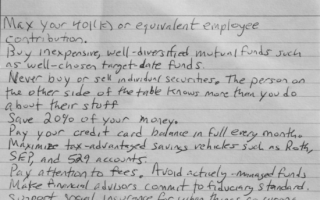
After a woman cursed me out in the grocery store the other day for daring to move her cart half a foot so I could reach an item (she was way down at the other end of the aisle), I’ve been wondering why we are so rude to one another. I’ve come up with lots of contributing factors including stress, overcrowding in cities and stores that makes you feel like you’re constantly being trod upon, a general “me” orientation in society, a hyper competitive society that only values the winner, and a lack of a “manners tradition” — kids aren’t taught manners the way they used to be, among others. I kind of knew all that, but the more I thought about it, the one contributing factor to rudeness that surprised me was financial success and comfort.
Before you jump all over me, I’m not talking about a rich vs. poor class war where the rich people are all rude snobs and the poor people are the good guys. Not all rich people are rude and not all poor people are kind. You find rudeness and kindness at all levels of income and I’m not about to stereotype one class or another in that way. What I’m talking about is financial success and comfort in a national or global sense.
There is no denying that these are generally comfortable times for much of the world. We may whine about gas prices or feel like we’re hurting when we can’t afford a vacation, but the truth is that the majority of people have at least adequate shelter, food and clothing, plus access to some form of medical care and a reasonable life expectancy. In times gone by, this was not the case. Many people struggled to find adequate food, and shelter was rudimentary and often shared by large groups. Medical care was non-existent and clothing was nothing more than the basics. However, as we’ve become more and more advanced as a society, we’ve solved many of these problems and now large numbers of people live at least adequately and many live quite comfortably, especially in comparison to our ancestors.
But this level of comfort comes at a price: Our success has isolated us from one another and made it easier to disregard others. We are no longer dependent upon our families and neighbors for assistance. Admit it: You probably don’t even know most of your neighbors in any terms other than “the guy with the blue car,” or “the lady with the weird hair.” We used to need the assistance of our communities to meet our basic needs. You traded your vegetables for your neighbors’ dairy products. If you were skilled in sewing, you bartered that skill with someone who was handy in carpentry. When you got old, others cared for you as you had cared for those before you. You couldn’t afford to be rude to people in your community because you might need their assistance one day. If you were rude to the one guy who had a dairy cow, chances are you wouldn’t be drinking any milk. As the old saying goes, you didn’t foul your own nest.
Now that we’ve become so comfortable that we can simply go out and buy the items and services that we need when we need them, we’ve lost some of the incentive to be kind to others. We’re so independent that others no longer matter; people have become disposable in our lives. It doesn’t seem to matter now if you’re rude to the checker at the grocery store. There are ten other checkers there and fifty other stores you can go to if you make such a fool of yourself that they tell you not to come back. Who cares if you yell at your flooring installer? There are a hundred other guys who can do the job just as well. So what if you snark at the guy in line ahead of you at the store with fifty coupons? You don’t know him and he can’t do anything for you, so snark away. Even within families is doesn’t seem to matter as much. So what if you are so rude to your brother that he cuts you out of his life? You won’t need him to care for you in your old age because you can just pay for a nursing home. The Internet makes is possible to avoid people altogether when conducting business, removing the human element completely from the equation and making it increasingly harder to deal with people when we do encounter them. If you shop online enough, you may actually forget how to be patient and kind in a store staffed by humans.
I think that our increasing financial success and comfort has cost us our civility to one another. Yes, there are the odd occasions where someone you’ve been rude to turns out to be the guy interviewing you for that great job, but by and large we can be rude to others with no financial consequences. It’s just too easy to meet our needs without ever needing to encounter another person, much less be nice to them. The question is: Can we get some of the civility back without reverting to the days of no electricity?
I think so, but it takes some re-imagining of the ways we do business and deal with one another. Part of what attracts me to the environmental movement is that it promotes more small scale (and therefore, more sustainable) economic models. If we moved much of our commerce out of the realm of global corporations and big box stores and got back to small neighborhood businesses, local agriculture, and systems of barter, we would take a significant step toward bringing back some of our sense of community. We would get to know one another again, value the skills of others, and understand that we are interconnected, not individuals acting in isolation.
Perhaps that’s the bright side of high gas prices. Maybe rising prices will force us to rethink how we interact with one another and force us to be more dependent on our neighbors and community members and, therefore, more civil to one another. Maybe you can make a start by organizing a carpool at work or asking your neighbors if you can get them something if you have to go out. Maybe you can barter your vegetables for your neighbor’s help in painting your house. If we needed our neighbors and community members again, we might find ourselves treating each other with more respect. Not fouling our own nests, as it were.
Do I think it will happen? Maybe, maybe not. Most people seem perfectly content to go along as we are, growing increasingly isolated from one another and ever more rude. But it could happen. Start with yourself. The next time you’re tempted to be rude to someone, or to dismiss them as insignificant, think how you would treat that person if he were the only one who had a skill or item that you needed to meet a basic need. Chances are, you’d swallow that smart remark, stop rolling your eyes, and treat that guy with some respect.
(Image courtesy of Nick Ares)

Jennifer Derrick is a freelance writer, novelist and children’s book author. When she’s not writing Jennifer enjoys running marathons, playing tennis, boardgames and reading pretty much everything she can get her hands on. You can learn more about Jennifer at: https://jenniferderrick.com/.






Comments